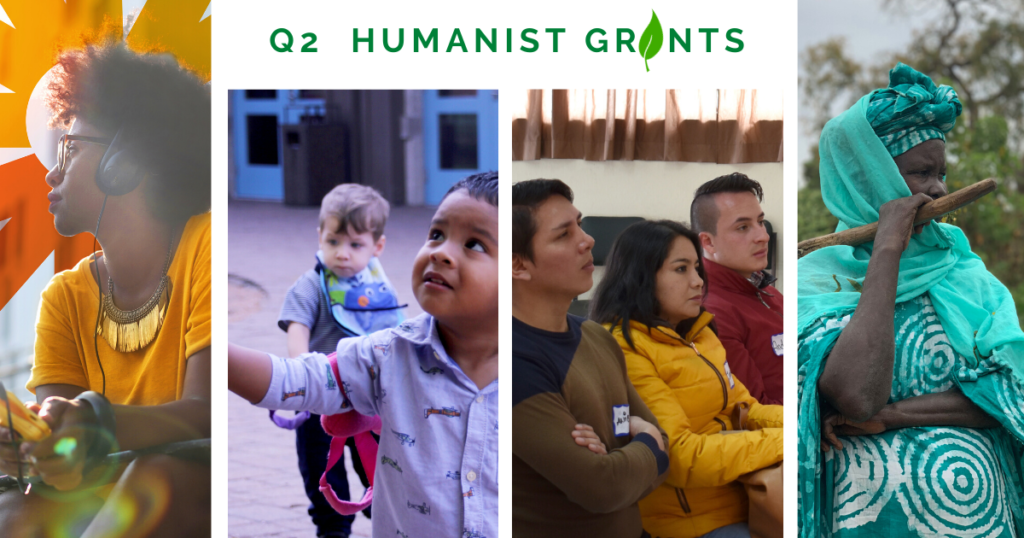Search results for: black nonbelievers
Welcome Quarter 2 Beneficiaries!
Welcome to our Quarter 2 Beneficiaries!
Read MoreIgnite Promise
Ignite’s mission is to stand with youth on their journey to a home and a future with promise. Ignite supports young people between 14 and 26 in Chicago who are experiencing homelessness or unstable housing with services that range from meeting immediate needs to long term support with vocational training, stable housing, and health care.…
Read MoreBeyond Belief Network Teams improve selves and community
Foundation Beyond Belief’s Beyond Belief Network is a network of secular humanist groups volunteering in their communities and raising money for FBB’s featured charities and programs. Any group with a public secular humanist or atheist identity is welcome to join, regardless of experience or group size. Four members of our Team of the Month for June…
Read MoreBeyond Belief Network Teams dive into service
Foundation Beyond Belief’s Beyond Belief Network is a network of secular humanist groups volunteering in their communities and raising money for FBB’s featured charities and programs. Any group with a public secular humanist or atheist identity is welcome to join, regardless of experience or group size. Members of Corpus Christi Atheists braved rain and cold…
Read MoreCan we really coexist? Reasons why people prefer their own groups.
1Brittany Shoots-Reinhard has a PhD in social psychology with a specialization in attitudes and persuasion, and judgment and decision making. She is also Foundation Beyond Belief’s Beyond Belief Network coordinator. This is the first post in series based on a talk Brittany recently gave for the Humanist Community of Central Ohio. One of the challenges of…
Read MoreCan we really coexist? Reasons why people prefer their own groups.
 Brittany Shoots-Reinhard has a PhD in social psychology with a specialization in attitudes and persuasion, and judgment and decision making. She is also Foundation Beyond Belief’s Beyond Belief Network coordinator. This is the first post in series based on a talk Brittany recently gave for the Humanist Community of Central Ohio.
Brittany Shoots-Reinhard has a PhD in social psychology with a specialization in attitudes and persuasion, and judgment and decision making. She is also Foundation Beyond Belief’s Beyond Belief Network coordinator. This is the first post in series based on a talk Brittany recently gave for the Humanist Community of Central Ohio.
One of the challenges of being a nonbeliever is being accepted by your friends and family; occasionally atheist groups find that their service or donations are unwanted by an organization. In fact, psychologists (e.g., Gervais et al., 2011) have found that atheists are a particularly disliked and distrusted group, even by liberal Christians. While our gut response may be derision for those irrational religious types, it’s good to keep in mind that prejudice and stereotypes are ubiquitous and a preference for one’s own group is fairly inevitable.
People have a tendency to see the world in terms of social categories and favoring the categories they belong to. Research on minimal groups shows us that even something as unimportant as preference for one abstract artist over another (e.g., Tajfel, Billig, et al., 1971; Brewer & Silver, 1978) is enough to create preferential treatment for one’s ingroup. Once someone identifies with an ingroup, favoritism is highly likely (Brewer, 1979). People with defensive self-esteem (those who report having high self-esteem when asked, but appear to have low self-esteem on more automatic measures) are especially likely to show ingroup favoritism (e.g., Jordan, Spencer, Zanna, et al., 2003).
 People want to be members of the best group; not only will they favor their own groups, they gravitate toward successful groups. Identification with a group can depend on the group’s recent success or failure. In a famous demonstration of this concept, Cialdini and colleagues (1976) at universities all over the United States showed that students were more likely to use the word “we” to refer to their college team following a win, but the team became “they” following a loss. They observed a similar pattern for wearing team apparel: People wear team clothes to link themselves to a successful team, but not an unsuccessful team. This “Basking in Reflected Glory” can make people feel better about themselves.
People want to be members of the best group; not only will they favor their own groups, they gravitate toward successful groups. Identification with a group can depend on the group’s recent success or failure. In a famous demonstration of this concept, Cialdini and colleagues (1976) at universities all over the United States showed that students were more likely to use the word “we” to refer to their college team following a win, but the team became “they” following a loss. They observed a similar pattern for wearing team apparel: People wear team clothes to link themselves to a successful team, but not an unsuccessful team. This “Basking in Reflected Glory” can make people feel better about themselves.
If you think that we do great work, using an FBB mug or joining might just make you feel better about yourself, too.
In addition to being more identified with successful groups, people remind themselves of worse groups when they feel bad about themselves. For example, people are more likely to discriminate or express prejudice when they feel threatened. Sometimes people directly derogate the source of negative feedback, if a negative stereotype exists (e.g., Sinclair & Kunda, 1999). Other times, the target of bias is unrelated to the self-threat (e.g., Fein & Spencer, 1997). Either way, derogating an outgroup can protect self-esteem.
We often focus on the downside of ingroup favoritism, but there’s really nothing wrong with identifying with a group per se. While we want to fight discrimination and prejudice, we should encourage people to identify with groups that have positive goals. People are influenced by the norms and goals of their groups as they become incorporated into them (e.g., Moreland & Levine, 1982), so encouraging people to join (and identify) with groups like Foundation Beyond Belief can make the world a better place for believers and nonbelievers alike.
Read More



